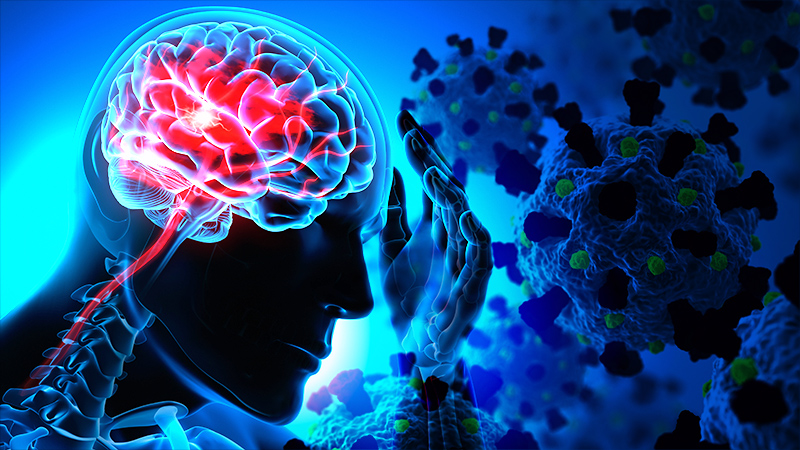Neurology and Strokes: Growing Incidences of Strokes Related To COVID-19 Leads To Proper Clinical Guidance Published
Source: Neurology And Strokes May 15, 2020 4 years, 11 months, 5 days, 19 hours, 16 minutes ago
Neurology and Strokes: In the last few weeks, medical experts have come to officially recognize that COVID-19 also causes or induces strokes in many COVID-19 patients and even many young adults are also developing strokes as a result of the SARS-CoV-2 coronavirus.
https://www.nejm.org/doi/full/10.1056/NEJMc2009787 and
https://www.ncbi.nlm.nih.gov/pmc/articles/PMC7187846/ and
https://jnnp.bmj.com/content/early/2020/04/30/jnnp-2020-323586 and
https://pubs.rsna.org/doi/10.1148/radiol.2020201629 and
https://jamanetwork.com/journals/jamaneurology/fullarticle/2764549 and
https://www.researchsquare.com/article/rs-20393/v1
Often the manifestation of strokes in COVID-19 patients either leads to fatalities or to serious medical condition.

To provide clinical guidance to other healthcare professionals, a University of Missouri Health Care neurologist has published more than 40 new recommendations for evaluating and treating stroke patients based on international research examining the link between stroke and COVID-19.
Dr Adnan I. Qureshi, a neurologists and Professor of clinical neurology at the Missouri University School of Medicine, led a team of stroke experts from 18 countries with documented COVID-19 outbreaks to develop recommendations for doctors evaluating patients with acute ischemic stroke who have either suspected or confirmed COVID-19 infection.
The study and guideline published by the
International Journal of Stroke also featured contributions from MU Health Care neurologist Camilo R. Gomez, MD, professor of clinical neurology at the MU School of Medicine.
https://journals.sagepub.com/doi/10.1177/1747493020923234
The researchers noted increased clotting in COVID-19 patients, which raised their risk for stroke. The research team found evidence that young people without previous risk factors for stroke are experiencing ischemic stroke with clots in the arteries of the brain presumably related to a COVID-19 infection.
It was observed that the average onset of stroke in COVID-19 patients occurred 10 days after infection, but in some cases, stroke was the initial symptom.
Please help support this website by kindly making a donation to sustain this website and also all in all our initiatives to propel further research: https://www.thailandmedical.news/p/sponsorship
Dr Qureshi told Thailand Medical News, "People may come to th
e emergency department with stroke, and that may be the initial manifestation of COVID-19 infection, which puts a clear burden on providers because now you may not know if the patient you are evaluating for stroke may actually have underlying COVID-19 infection. The purpose of these recommendations is to provide a step-by-step guide of how to manage these patients. The modifications we suggest have implications for the health of patients, but also the health of those who are involved in their care."
Dr Qureshi's study indicates health care workers are at risk of acquiring COVID-19 from stroke patients and they should take safety precautions while limiting the number of care providers who have direct interaction with each patient. The guidelines also call for providers to treat any suspected COVID-19 stroke patient as though the patient has the infection, ensuring the sanitation of all equipment used during the stroke assessment. If a stroke patient is suspected to have COVID-19, a chest CT scan can provide rapid evidence of a possible infection in the lungs.
He added, "Since COVID-19 actually involves the lungs, a simultaneous scan of the chest and brain can check for stroke and identify changes in the lungs that may identify whether this patient truly has or does not have COVID-19 infection. This step has been incorporated into acute stroke protocol at MU Health Care."
Dr Qureshi encourages stroke patients and their family members to recall any symptoms of dry cough, fever or body aches before the stroke, which may help the provider determine if the stroke is related to an underlying COVID-19 infection. If a COVID-19 infection is confirmed and other organs have been affected, guidelines suggest a Sequential Organ Failure Assessment (SOFA) can provide an overall prognosis before determining the appropriate stroke treatment in COVID-19 patients.
While the incidences of clots are increasing among COVID-19 patients, genomic and also virology experts are calling for more attention to be paid at emerging mutated viral strains of the SARS-CoV-2 as it is being speculated that perhaps the newer strains are getting more potent and are also changing in the way that it “attacks” the human host.
For more on
neurology, strokes and COVID-19, keeping logging to Thailand Medical News.
Please help support this website by kindly making a donation to sustain this website and also all in all our initiatives to propel further research: https://www.thailandmedical.news/p/sponsorship
